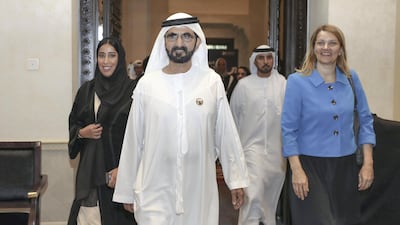A law ensuring women are paid an equal wage to their male colleagues was approved by the UAE Cabinet on Tuesday.
Sheikh Mohammed bin Rashid, Vice President, Prime Minister and Ruler of Dubai, made the announcement on Twitter saying: “With the strength and rule of the law, we do not want any exceptions in providing equal opportunities for both sexes.
“Our Constitution ensures equal rights among the sexes and we seek to enforce and guarantee this right through the new law.”
The UAE ranks second in the Middle East for 'wage equality for similar work', studies have shown, but it fares far less well in global gender rankings.
The Emirates ranked 120 out of 144 countries overall in the 2017 World Economic Forum's (Wef) Global Gender Gap Report.
Yet it was closing the gender gap, according to the report, bucking the global trend of a widening disparity in areas such as health, education, politics and the workplace for women.
News of the gender equality law has been welcomed by women at the highest levels of the UAE Government.
Sheikha Fatima bint Mubarak, Chairwoman of the General Women's Union, President of the Supreme Council for Motherhood and Childhood, and Supreme Chairwoman of the Family Development Foundation, said the move was part of the UAE’s approach in empowering women.
Noura Al Kaabi, Minister of Minister of Culture and Knowledge Development, hailed the law as a continuation of the country's commitment to gender equality.
"The UAE has always placed gender equality at the forefront of its national values and priorities," she said. "The newly approved gender pay gap law highlights this commitment in the workplace, which will empower women to pursue equal opportunities and contribute to the UAE's development."
Reem Al Falasi, Secretary-General of the Supreme Council for Motherhood and Childhood and board member of the gender balance council said the councils have been reviewing and pushing for the law.
"It is not unusual or unprecedented in the UAE because from the start women in the UAE enjoyed equal rights. There isn't a single job opportunity that Emirati women have been denied from. Today they are ministers, astronauts, fighter pilots and in every field"
She said the law is a small addition to a system that is already in place.
“You can describe it as the cherry on top,” she said.
Some industry observers said the new law represented a significant step in the right direction, but cautioned that enforcement may prove to be a challenge.
“All of the advanced and progressive economies of the world are reviewing legislation about how they can implement such a law in practice,” said Harish Bhatia, associate client partner and market leader for the Middle East at Korn Ferry Products Group.
“From an intent it's very powerful as a message. And the UAE and the Government of the UAE is always thinking about how they can be one step ahead.”
The management consultant works with more than 750 organisations in the UAE and around 2,500 companies in the region.
The vast majority — more than 90 per cent of them — do not have pay policies which discriminate on the basis of an employee’s gender.
Yet, he acknowledged that pay gaps do exist in certain industries. And he said that could be due to policies, rather than practices.
“There are some policies within HR which [do not help close] the gender pay gap,” said Mr Bhatia.
“For example housing allowances.”
Some companies may prevent a female employee from receiving housing allowance if it is part of their partner’s package through policy, making their husband’s salary seem overinflated by comparison, he said.
“Housing is the major contributor and can make a significant difference to total pay,” said Mr Bhatia.
Toby Simpson, a former managing director at a large UAE recruitment firm with 11 years’ experience in the industry, said he has never dealt with a company which has based salary decisions on the basis of a person’s gender.
“I don’t cover the entire market, so perhaps there is a company out there with systematic gender discriminatory pay practices, but I doubt it simply because it does not make sense to a company from an economic perspective, and companies with uncompetitive practices usually do not survive long,” said Mr Simpson.
However, research among Korn Ferry’s clients showed that a gender pay gap does exist in the UAE market, albeit among only certain nationalities, and not necessarily because of discriminatory policy.
Salaries tend to be equal between male and female UAE Nationals, said Mr Bhatia.
But a disparity exists among non-Nationals.
“The distribution of workforce is a little bit different in the non-Nationals. You tend to find more women in the administration jobs rather than in highly skilled jobs within banking or specific sectors like oil and gas. It might show that they are being paid more but it is not a policy intent,” said Mr Bhatia.
The Law on Equal Wages and Salaries for Men and Women will ensure women have equal opportunities in the UAE’s development, and are further empowered women to lead future national strategies and ambitious projects, reported state media agency Wam.
It also contributes to the Strategy for the Empowerment of Emirati Women launched by Sheikha Fatima.
The UAE Government has made several moves towards narrowing the gender gap.
In 2015, the UAE Council for Gender Balance was established and in September, the UAE launched the world's first Gender Balance Guide.
The guide was described in a statement from Dubai Media Office as a reference tool to "narrow the gender gap across the UAE’s private and public institutions".
* additional reporting by Shireena Al Nowais


